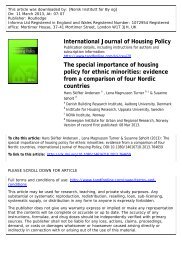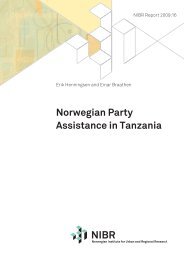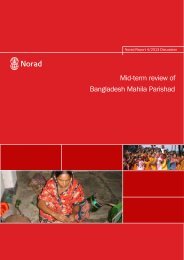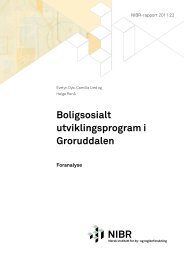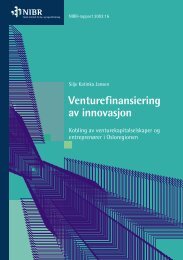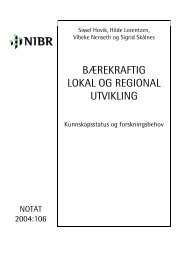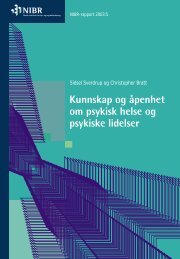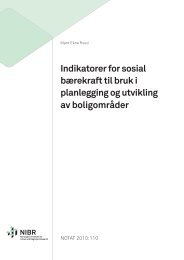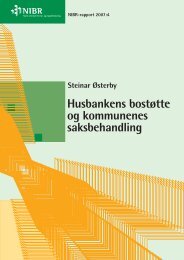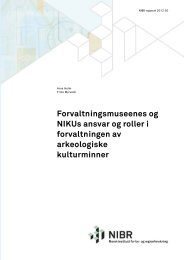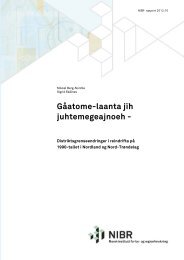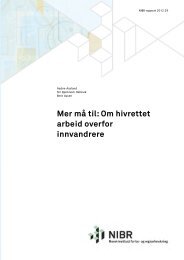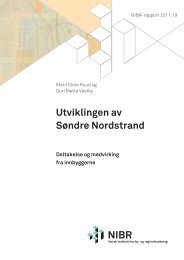Evaluation of the Southern and Eastern Africa Regional Centre for ...
Evaluation of the Southern and Eastern Africa Regional Centre for ...
Evaluation of the Southern and Eastern Africa Regional Centre for ...
- No tags were found...
You also want an ePaper? Increase the reach of your titles
YUMPU automatically turns print PDFs into web optimized ePapers that Google loves.
Views on sustainabilityIn light <strong>of</strong> <strong>the</strong> near total dependence upon Norwegian funding sources, <strong>and</strong> <strong>the</strong>obvious threat should that funding end or be reduced, <strong>the</strong> issue <strong>of</strong> sustainabilityshould be a priority <strong>for</strong> <strong>the</strong> <strong>Centre</strong>. However, we have seen very limited discussion <strong>of</strong>this, <strong>and</strong> that was only during <strong>the</strong> last (2012) regional board meeting. The RNE hasraised <strong>the</strong> issue <strong>of</strong> alternative sources <strong>of</strong> funding <strong>and</strong> financial sustainability <strong>of</strong> <strong>the</strong>centre in annual meetings since 2010, when Norad also flagged this up in a memo(dated, 2010). Management at SEARCWL consider <strong>the</strong> funding <strong>for</strong> <strong>the</strong> programmesufficient <strong>and</strong> as a result have ‘not found it necessary to seek additional funding’(mid-term review, 2010). It also appears that <strong>the</strong> regional advisory board has onlyraised it in 2012. The process <strong>of</strong> getting to this point, we were told by <strong>the</strong> Director <strong>of</strong>SEARCWL, was because <strong>the</strong>y simply had not had to make alternative arrangementswhilst <strong>the</strong>re was <strong>the</strong> predictable flow <strong>of</strong> funds from Norway.The <strong>Centre</strong>’s staff said in <strong>the</strong> SWOT exercise <strong>and</strong> in individual interviews that <strong>the</strong>yhave started <strong>the</strong> process <strong>of</strong> considering potential donors, but that <strong>the</strong>y had notarrived at any conclusions yet. There are various views on <strong>the</strong> possibilities <strong>of</strong> gettingo<strong>the</strong>r donors <strong>for</strong> <strong>the</strong> <strong>Centre</strong>. The Director thought it might be challenging to findo<strong>the</strong>r donors given that more general democracy <strong>and</strong> human rightsprojects/programmes are more attractive to fund. Staff at <strong>the</strong> RNE, however,believed that it would be possible to find o<strong>the</strong>r donors, who could provide funding,at least contribute with part <strong>of</strong> <strong>the</strong> necessary funding <strong>and</strong> were willing to assist inmeans to achieve this. Pr<strong>of</strong>essor Anne Hellum - <strong>the</strong> <strong>Centre</strong>’s collaborating partner atUniversity <strong>of</strong> Oslo- <strong>and</strong> also board member, Pr<strong>of</strong>. Himonga, University <strong>of</strong> CapeTown, were both <strong>of</strong> <strong>the</strong> opinion that it would not be difficult <strong>for</strong> <strong>the</strong> <strong>Centre</strong> to findo<strong>the</strong>r donors to fund <strong>the</strong>ir work. An obvious possibility is like minded donors.In conjunction, an unexplored possibility concerns <strong>the</strong> NORHED programme.According to <strong>the</strong> Director at SEARCWL, <strong>the</strong> time frame <strong>for</strong> <strong>the</strong> most recent callconcerning seed funding had been unrealistic due to an arduous 18 month courseprogramme <strong>and</strong> that funding was already available <strong>for</strong> that period. One would alsoneed to consider whe<strong>the</strong>r NORHED is open <strong>for</strong> regional programmes. However,upon closer reading NORHED states “projects may consist <strong>of</strong> one partnerinstitution in a LMIC <strong>and</strong> one Norwegian partner institution. However, projects withmore than one LMIC partner institution are encouraged, in order to create <strong>and</strong>streng<strong>the</strong>n regional academic networks” (page 11, NORHED draft programmedocument). <strong>Regional</strong> programmes <strong>and</strong> Master education programme <strong>for</strong>m onecriterion. All LMIC in <strong>Africa</strong> are qualified <strong>for</strong> support, including Zimbabwe. Theevaluators have checked with <strong>the</strong> responsible person <strong>for</strong> NORHED in Norad thatcollaboration between Norwegian <strong>and</strong> Zimbabwean Universities as well as regionalcollaboration within <strong>Africa</strong> qualify <strong>for</strong> applying to <strong>the</strong> NORHED programme. O<strong>the</strong>rindicators <strong>of</strong> <strong>the</strong> scope <strong>for</strong> NORHED funding include that <strong>the</strong>re are at least 3-4projects that have got seed funding that have a regional foundation, regional centres,etc. Currently, one project has got seed funding in Zimbabwe.The NORHED programme supports a wide range <strong>of</strong> activities that <strong>the</strong> centre currentlyundertakes, ranging from curriculum development, teaching, <strong>and</strong> research by staff <strong>and</strong>collaborating partners, PhD scholarships, capacity building <strong>of</strong> technical <strong>and</strong> administrativestaff, support to library, <strong>and</strong> technical equipment. The NORHED actively encourages <strong>the</strong>47



